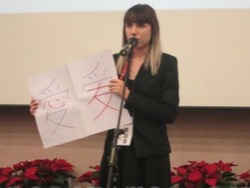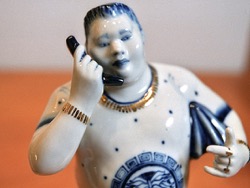
The Chinese language is considered one of the most difficult to learn by foreigners, but also for the Chinese themselves to learn it, much less use is not very easy. More than a third of China’s population doesn’t know official Chinese language.
American Professor David Moser said that in the Chinese language there are three totally independent from each other part, and the hardest thing to remember is the characters, according to the newspaper Los Angeles Times.
Moser has lived in China for more than 20 years and has more than 30 years studying the Chinese language. Previously, he lectured in linguistics at Beijing University of foreign languages, has collaborated with the Chinese Academy of Sciences, and often took part in different TV programs on Chinese television.
Language that contains alphabetic writing system, learning is much easier in conversation, reading and writing independent of each other and learn at the same time. But in Chinese language, if you, for example, learned to speak, it will not help you to read and even more will not help to write. Speaking, reading and writing in the Chinese language are entirely separate from each other parts of the language.
But this difficulty does not end, says Moser. Once the alien learned the official Chinese language is Putonghua (Mandarin) and came to China, he was surprised to detect that what he was taught at home, not like in reality.
The fact that in China there are not only many different accents there are in English-speaking countries, there exist numerous dialects, whose speakers do not understand each other, if you do not know Putonghua.
Despite all the efforts of Communist authorities to implement in a multiethnic country, a single language, representatives of different nationalities and people from different areas of mainland China have maintained and continue to make extensive use of local dialects.
According to Moser, according to statistics from the Ministry of education of China, currently in China, home to 400 million people who do not know the official Chinese language — Mandarin.
For people in many remote areas of the country, Mandarin is only the language set by the government, which broadcasts TV channels. The question of language, these people in China, in fact, are the same as foreigners. But writing all the same, but the sentence structure may also vary.
If forced to promote Putonghua in areas where local dialects are only slightly different from the official language, it will not cause much damage to their culture. But if you do it in areas where the difference between dialects is very large, for example, where use of the Shanghai, Guangdong, Chongqing dialects, the cultural heritage may be significant damage, said Moser.
So, Guangdong (Cantonese) dialect, which is spoken by tens of millions of people, carries a very deep component of the local culture. There is a Cantonese theater yatsui), folk tales and so on. If all of this translate in Mandarin, then the whole culture will be lost.
Moser says that the speakers of Cantonese in China do not welcome the government’s attempts to replace their official language. Many do not hide the discontent that the government restricted the number of TV programs in Cantonese language. For them it is not just the language, it’s the whole cultural layer, which they don’t want to lose.
Prior to the founding of the PRC local dialects in China, easy to get along with the official language, but after coming to power of the Communist party this harmony was destroyed.
Currently the Communist party is making the most active efforts to promote Putonghua in Tibet and Xinjiang, where there are the most numerous in China after the Han national group — the Tibetans and the Uighurs. In many schools there are literally forbid students to speak their national language.
According to Moser, this enforced sinification of these regions can be dangerous from the point of view of social stability, as local residents may find that the authorities want to destroy their culture.
He also spoke about the harmful impact on the language of the universal computerization. The fact that many Chinese have become so accustomed to recruit characters to your computer or smartphone using the “Pinyin” that they cannot write a kanji in the traditional way.
As an example, Moser brings his wife, a Chinese woman who was born and raised in China. When he asks her how to spell some character, she often said, “Give me a computer, I’ll show you. I can’t remember how to write it”.








